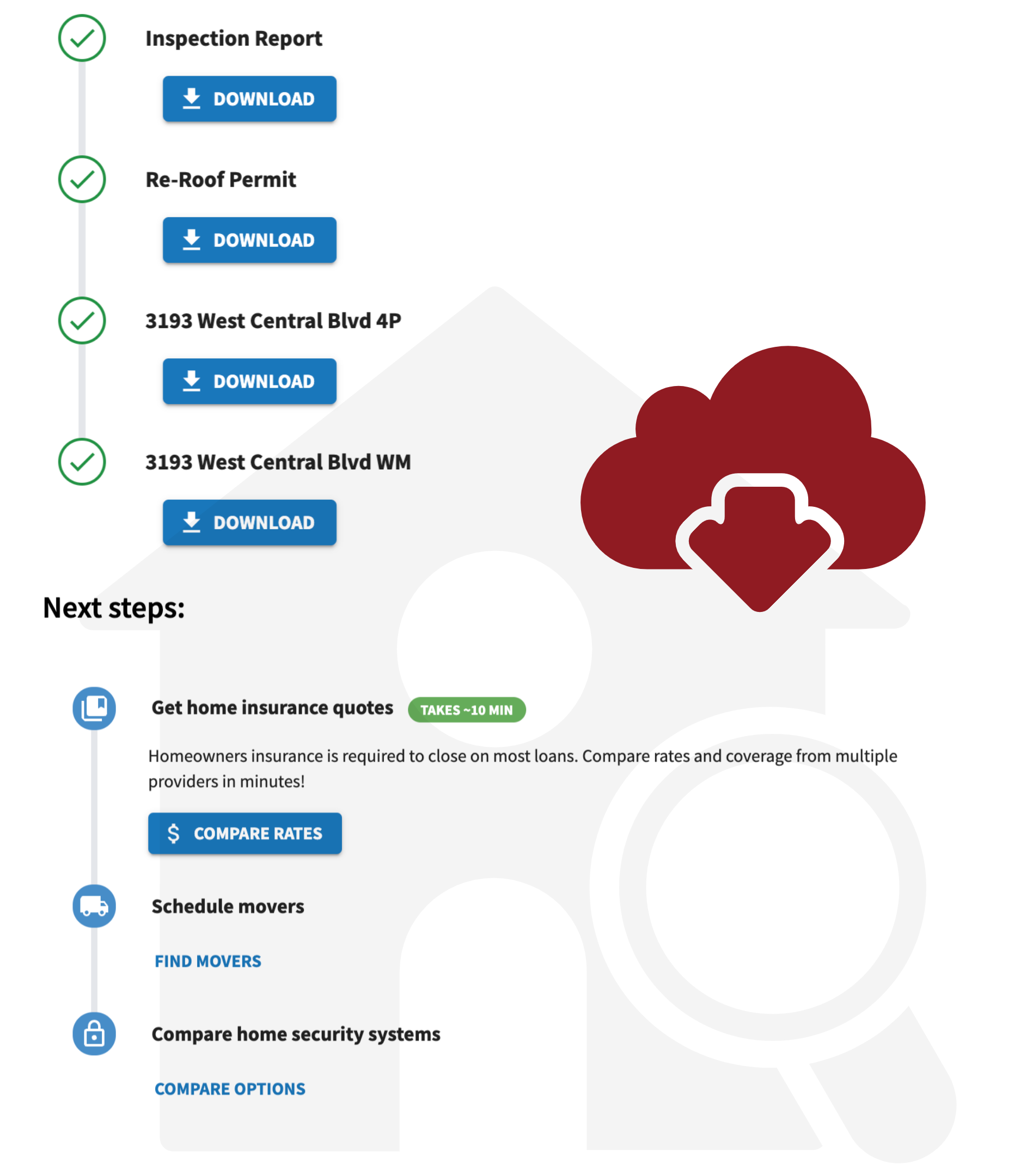HOME INSPECTIONS
BUYER SIDE / SELLER SIDE
A home inspection is a professional, objective assessment of a property's physical structure and major systems. It's a vital step in the home buying process, helping to uncover potential issues before closing, so buyers can make informed decisions.
As the buyer, you have the right to choose your own home inspection company. You're not required to use one recommended by the agent or seller—feel free to select a licensed inspector you trust to thoroughly evaluate the property and protect your interests.
Once the inspection and payment is made, you'll receive access to your personalized buyer portal, where you can view your inspection report, photos, and any recommended next steps
INSPECTION “ADD-ONs”
A 4-point inspection is often required by insurance companies in Florida, especially for homes over 20 years old. It focuses specifically on the roof, electrical, plumbing, and HVAC systems to determine insurability. While it's not part of a standard home inspection, it can usually be added on during the same visit and is essential for securing homeowners insurance.
For a cash buyer, a 4-point inspection is not required, since there's no lender or insurer mandating it—unless the buyer still plans to get homeowners insurance.
A wind mitigation inspection evaluates how well a home can withstand strong winds and hurricanes—a key factor in Florida insurance costs. It looks at roof shape, coverings, attachments, and protection for openings like windows and doors. This report can often qualify buyers for valuable insurance discounts.
A well inspection checks the condition and safety of a property's private well system, including the pump, pressure tank, and water quality. It ensures the water is safe for use and that the system is functioning properly—an important step for homes not connected to municipal water.
A septic tank inspection evaluates the condition and functionality of a home's private wastewater system. It includes checking the tank, drain field, and related components to ensure proper operation and identify any signs of leaks, backups, or needed maintenance—crucial for homes not connected to public sewer lines.
A water test analyzes the quality and safety of a home's water supply, checking for contaminants like bacteria, lead, nitrates, and other pollutants. This is especially important for properties with a well, ensuring the water is safe for drinking, cooking, and daily use.
A termite inspection checks for signs of active or past termite activity, as well as other wood-destroying organisms that can damage a home's structure. It’s a vital step in protecting your investment, especially in Florida’s warm, humid climate where termites are common.
Real estate agents play a crucial role in recommending home inspections and helping clients understand the results. They guide buyers and sellers through the implications of the findings, advise on necessary repairs, and help protect both the property's value and the client's interests.
For sellers, a pre-listing home inspection gives sellers valuable insight into their property's condition. By identifying and addressing issues early, sellers can increase market value, build buyer confidence, and help ensure a smoother, faster sale.
Sample section of inspection results:
Once the home inspection report is in hand, it can feel overwhelming for buyers—especially first-timers. That’s where a knowledgeable real estate agent steps in. As your advocate, a Realtor doesn’t just review the report; they help you interpret it strategically.
Not every item on an inspection report is worth negotiating over. Your agent will help you identify which issues are safety concerns, code violations, or major system failures—and which ones are cosmetic or expected for the home’s age. From there, your agent will work with you to draft a clear, reasonable repair request or ask for seller concessions if appropriate.
This negotiation process requires a balance of firmness and finesse. An experienced agent knows how to present your request professionally, keeping the deal moving forward while protecting your best interests.
PRE-LISTING INSPECTION
Sellers benefit from home inspections by gaining transparency about their property's condition. Pre-inspection enables sellers to address issues ahead of time, enhancing market value and speeding up the sale.
Top 10 Things Sellers Should do to Prepare for an Inspection:
Change the AC filter and clean vents. A dirty filter or dusty vents suggests poor maintenance. A fresh filter and clean ducts show the HVAC system is being properly cared for.
Check for plumbing leaks. Inspect under sinks, around toilets, and behind appliances for any signs of leaks or water damage. Fix drips, loos connections, and water stains.
Test all smoke and carbon monoxide detectors. Replace batteries and ensure all detectors are property installed and working.
4. Service the HVAC system. Have the AC and heating system serviced by a licensed technician if it hasn’t been done in the past year. Leave documentation of the service for the inspector.
5. Ensure all lights, outlets and fixtures work. Replace any burnt-out bulbs, and test each outlet. This avoids the assumption that electrical work may faulty.
6. Clean gutters and dowspouts. Clear out debris and ensure water is draining away from the foundation properly.
7. Repair minor wall and ceiling cracks or nail pops. There are often cosmetic but can be misinterpreted as foundation or structural issues.
8. Check doors and windows for proper operation. Make sure they open, close and lock properly. Fix any sticking, squeaking, or loose hardware.
9. Seal gaps around windows for proper operation. Prevent drafts, moisture intrusion and pest access. Use caulking or weaither stripping where needed.
10. Label the electrical panel and ensure clear access. Inspectors need to see the panel clearly labeled and unobstructed. Replace any missing covers or breakers if needed.
“THANK YOU!”














